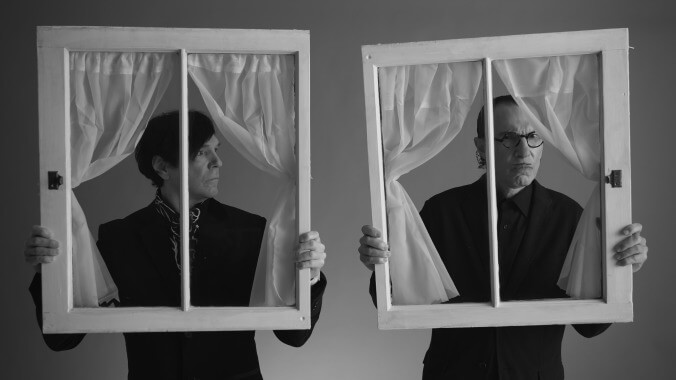Edgar Wright crafts a loving if overlong tribute to the enigmatic pop group Sparks
The director's enthusiasm is infectious, even when it wears out its welcome


The image of the art pop group Sparks tells a story. They’re a duo, Russell and Ron Mael, who one would assume to be brothers even if they never confirmed it. The former, a dashing frontman who sings in falsetto and cavorts around the stage like an imitation Mick Jagger; the latter, an aloof keyboardist and songwriter who shoots jokingly sinister looks enhanced by a mustache reminiscent of either Chaplin or Hitler. While the visual contrast is simple (“the cute one” versus “the quiet one”), they’ve maintained an enigmatic image, garnering curiosity, adulation, or outright dismissal from peers and audiences alike. They look entirely like themselves.
Their music, on the other hand, tells many stories. Over the course of five decades, Sparks have cannibalized multiple genres—glam rock, disco, synth-pop, techno, neo-classical—and though their sound has often overlapped with the zeitgeist, they’ve never commercialized it as a sop to fans or suits. Ron Mael’s lyrics are funny, either telling cheeky short stories filled with eye-raising innuendo or self-reflexively commenting on itself. They inevitably inspire debates about how ironic the brothers are being or how much distance lies between them and the narrators of their songs. A quintessential cult band, Sparks strongly polarizes; their music tends to turn listeners into fierce partisans or sharp critics. (In 1975, Village Voice critic Robert Christgau called them “self-made twerps,” who “chant or gibber in a style unnatural enough to end your current relationship or kill your cacti.”) They’ve kept a low enough profile to still be discoverable by the masses and yet have been around long enough to have influenced many highly celebrated bands.
If you’ve never heard of Sparks, the good news is that you’re the perfect viewer for Edgar Wright’s documentary The Sparks Brothers, a two-hours-plus sales pitch for why they’re worth your time. Featuring talking-head interviews with the Mael brothers as well as collaborators and celebrity acolytes, this passionate tribute to the duo follows them from early childhood to present day, tracing a path through almost every one of their 25 studio albums. Wright, dabbling in rockumentary after a run of pastiches like Shaun Of The Dead and Baby Driver, rigorously curates the film with delightful archival footage of the group, as well as stop-motion animation and visual puns in the form of film clips and goofy reenactments that complement the commentary. The director’s hyperactive, everything-and-the-kitchen-sink pop style neatly meshes with Sparks’ genre-bending sound and the kitschy appeal of their music videos and TV appearances. Perhaps aware that some might be watching the film primarily because he made it, Wright makes an effort to keep the flood of information entertaining. For Sparks fans, the results may resemble an impressively organized YouTube playlist annotated by experts and fellow admirers.
The Sparks Brothers covers the basic questions—“Are they British?” (No) “Are you sure?” (Yes) “Are they joking?” (Sometimes)—before taking a gently deep dive into their storied career, tracking their many musical reinventions and commercial disappointments and minor pop sensations. The diversity of the interviewees is itself a testament to the band’s reach: Pop stars, punks, comedians, and actors alike all voice their considerable support, explaining with accessible fervor how they connected with Sparks’ unique style. Everyone from Jack Antonoff to Mike Meyers to Flea extrapolate on why the group has flown so far under the radar while clicking with such varied people. It’s possible you might know that Sparks’ third album, Kimono My House, was beloved by Kurt Cobain and Morrissey, but actually hearing former Joy Division drummer Stephen Morris draw a line between “Love Will Tear Us Apart” and “The Number One Song In Heaven” has a power all its own.
Wright’s campaign is at least partially stymied by its bloat. At 140 minutes, The Sparks Brothers eventually wears out its welcome. The talking heads reiterate a few points ad nauseam, until the sentiments become redundant: Sparks never let commercial failure hinder their determination; Sparks constantly reinvented themselves, unconcerned with nostalgia or alienating fans; it’s those very qualities that have endeared Sparks to listeners worldwide. The testimonials become vaguer and the stories less compelling following the band’s six-year hiatus from 1988 until 1994, and Wright’s commitment to covering every album warps the film’s pace and timing, two qualities that are usually the director’s métier. At its best, The Sparks Brothers courses with the energy of one of your smartest friends talking your ear off about their favorite band. Eventually, however, it begins to resemble a zealous fan going on too long about their pet darling at the expense of any case they might be making.
Nonetheless, it’s touching to see a director of Wright’s stature advocate for an under-appreciated favorite. To express his enthusiasm, he highlights other people’s, such as when Jane Wiedlin of The Go-Go’s talks about her collaboration and brief romance with Russell as if she was living out a teenage fantasy. Some moments speak clearly for themselves: When Paul McCartney homages Ron Mael’s signature look in the “Coming Up” music video, it’s moving precisely because the brothers tell a childhood story of their mother driving them to Las Vegas to see The Beatles. It’s also nice to see some professional arcs play out neatly, like the Mael brothers’ collaboration with filmmaker Leos Carax on the forthcoming Annette after Wright details the band’s previous failed film projects. In many ways, Sparks are a sideways success story that serves as a perfect rejoinder to the algorithmic now: Two weirdos with a symbiotic creative relationship persist for over 50 years because they constantly bet on themselves. There are worse things than a filmmaker who followed in that tradition giving it its proper due.